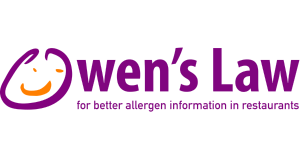
Safe to serve: Public wants more allergy awareness in eateries
What is the reality of living with a food allergy in the UK, and how can businesses provide a safe dining experience for all?
Introduction
This comprehensive Food Allergen Report has been developed by High Speed Training. The report presents research that includes data from a YouGov survey conducted with 2,134 UK participants.
Through this report we delve deeper into the data, highlighting the level of awareness, understanding and impact of food hypersensitivities while also calling for enhanced safety measures within the food industry.
High Speed Training is a leading provider of accredited food safety training and proudly offers the only Food Allergen Awareness course officially endorsed by the Owen's Law Campaign.
What are food hypersensitivities?
Food hypersensitivities refer to our body's heightened reactions to certain types of food. This term covers conditions such as food allergies, intolerances and coeliac disease.
A food allergy is when our immune system reacts to a type of food. Allergic reactions can happen quickly, ranging from symptoms like itchiness to more severe reactions like anaphylaxis that can be fatal.
A food intolerance is not life-threatening but it can cause discomfort with symptoms usually appearing gradually.
Coeliac disease is a disorder where consuming gluten - a protein found in wheat, barley and rye - can damage the small intestine.
Why does this matter?
These conditions can have consequences. As you'll read in this report some cases can be life-threatening. Think about not being able to eat a meal without the worry of having an allergic reaction. Unfortunately this is the reality for more than two million people living with food allergies in the UK.
The UK's silent epidemic
Currently, the UK has some of the highest rates of food allergies in the world. It is a ‘growing epidemic', as younger generations are far more likely than ever before to develop them.

One in five of those with a food allergy live in fear of death due to anaphylactic shock1.

25% of people with a food allergy will at some point experience a severe anaphylactic reaction2.

A steep increase of 154% in hospital admissions for food-induced anaphylaxis has been found3.
Developments in allergy safe practices
Thankfully, people are starting to report on this growing food allergy epidemic, and there's a growing awareness of the importance of safeguarding sufferers of hypersensitivities. In fact, various developments in allergy safety practices over recent years suggest a positive shift in the way we approach the issue.
Natasha's Law
In October 2021, Natasha's Law4 was introduced, requiring businesses to declare a complete list of ingredients on any pre-packaged food items that are for direct sale (PPDS). The law was introduced after the tragic death of Natasha Ednan-Laparouse, who suffered a fatal anaphylactic reaction after eating a pre-packaged baguette which, unbeknownst to her, contained sesame seeds, to which she was highly allergic. It's now been two years since Natasha's Law was introduced and the impact is positive, with 40%5 of food hypersensitivity sufferers saying their lives have been improved as a result of the new law.

Owen's Law
The Owen's Law Campaign6, seeks to mandate allergen labelling on restaurant menus and advocates for proactive communication between restaurant staff and customers regarding potential allergens, alongside thorough staff training in allergen awareness.
The campaign honours the memory of Owen Carey, who tragically lost his life to an allergic reaction after dining out. The Carey family has been at the forefront of the campaign, aiming to prevent similar tragedies in the future.
High Speed Training is proud to be the first training provider to receive an official endorsement from the Owen's Law Campaign. This recognises the comprehensive and rigorous nature of our training, which goes beyond standard guidance and promotes best practices.
In December 2023, the Food Standards Agency (FSA) agreed that they would like to see the provision of written allergen information in the non-prepacked sector be mandated, as called for by the Owen's Law Campaign. The FSA has written to make this recommendation to Ministers in England, Wales and Northern Ireland who are responsible for taking this forward.
“I would expect many businesses to quickly take steps to proactively provide written allergen information on their menus before this becomes a legal requirement. Food business operators will also need to continue to make sure there is an understanding of the current legal requirements amongst all of their staff.”
- Paul Turner, Environmental Health Officer and diagnosed Coeliac
Death of James Atkinson
In 2020, James Atkinson tragically passed away after eating just a few mouthfuls of a takeaway chicken tikka masala pizza that, unknown to James, contained peanuts, to which he was highly allergic. In January 2024, at the inquest into his death, Coroner Karen Dilks stated that she intends to write to the relevant authorities in support of Owen's Law, demonstrating again the urgent need for Owen's Law to be implemented as soon as possible.
Where does this leave hypersensitivity sufferers today?
Although these developments show an encouraging trend in awareness and action taken around allergen safety, the reality is that there is still a long way to go. Both Natasha's Law and Owen's Law were derived from tragic deaths of two young people, and their fate reflects much wider and ongoing devastation. Unfortunately, despite new measures being designed to prevent future tragedies, the danger and fear for allergy sufferers is still very real. Our recent survey found that 75% of people are concerned about complacency around food allergies.
Key Findings

32% had a food allergy or someone close to them did

84% believe food allergies are a serious issue

24% believe the issue of food allergies has been exaggerated in recent years

75% are concerned about complacency around how food allergies are handled

61% of people believe food businesses aren't doing enough to cater to people with food allergies

1 in 2 thought people with allergies are often perceived as fussy or overstating the severity of their condition
The reality for an allergy sufferer eating out
Everyone should be able to feel safe and included when eating out. Unfortunately, however, allergy sufferers still feel that not all restaurants cater to them, which can lead to fear and anxiety.
We spoke with an allergy sufferer to discuss their experiences and understand the realities of eating out with a hypersensitivity:
“In 2009, I ordered a burger and chips from a gastro pub in London. Less than an hour later I was in A&E unable to breathe. I thought it was an asthma attack, but hospital staff told me I was suffering from a major allergic reaction. I was lucky enough to recover after being flushed out with steroids, fluids and treatment to calm my heart rate and was discharged the next day, however I felt very wary about eating anything for a few weeks.
It can be incredibly nerve wracking, especially somewhere new so I'll check review sites and see if there are any positive reviews about how the restaurant has dealt with allergies in the past.
Every time I mention my allergy, you never know if it will be taken seriously by the person taking the order or if the message is even delivered to the kitchen. If I'm in a group, I used to feel really awkward having to flag it as sometimes people (even those you are out with) just think you're making a fuss over nothing and it's not that serious.”

Laura Pattison
Allergy sufferer
Regrettably, Laura is not alone in this experience. From our findings, 1 in 2 people think those with allergies are often perceived as fussy or overstating their condition, showing there is still a lack of awareness around the potential severe outcomes of hypersensitivities.
Ultimately, lives are at risk if allergies are not addressed properly, so it's imperative they are taken seriously. Businesses should understand why building awareness of allergens is necessary, and aim to be fully transparent and inclusive.
A leading business example
The importance of food allergen management cannot be overstated. It is important not just for businesses in the food industry, but also for school canteens and organisations involved in food preparation and service. The reason is simple and vital - food hypersensitivity is a serious concern that can cost lives.
A shining example of how a food business can operate with food hypersensitivity in mind is Niche, a restaurant in London that has set the bar high regarding allergen management by offering a 100% gluten, nut and sesame-free menu. Their approach is comprehensive and meticulous, ensuring that customers enjoy their meals without fear of an allergic reaction. We spoke with Marc Warde, owner of Niche, who in the below video demonstrates that with the right practices and mindset, managing food allergens effectively is not only possible but also imperative for the safety of customers.

Key takeaways
The rising prevalence of food allergies in the UK is evident, impacting social dining choices for many. A third of people we surveyed had, or knew someone close to them with, a food allergy, meaning a large portion of group bookings will be dependent on restaurants to be compliant.
According to our survey, 61% of consumers believe food businesses aren't doing enough and should enhance their efforts to accommodate food allergies. Emphasising the need for increased awareness and measures in the industry.
While it may initially seem overwhelming to have the necessary safety precautions and controls in place, there's a number of small steps that you can take to have a big impact.
Ensure you are taking the right steps by following these three tips:
Promote effective communication

Whether you are a manager or a front-of-house employee, being able to communicate effectively with staff members and customers is vital.
Implementing a proactive approach to asking your customers about allergies or intolerances before ordering can help to increase confidence7 and result in a more positive experience.
Be prepared to show empathy and understanding of the risks posed by allergens, particularly when answering queries from customers. If you receive a request for allergy information, it's essential that you are able to confidently communicate the correct answer in a way they understand.

Read our article on the Importance of Effective Communication in the Hospitality Industry to find some tips for improving communication in your own business.
Ensure staff complete food allergen training

Staff must understand what they are required to do to keep customers safe. Having this knowledge can save lives.
As Emma Kocher, sister of Owen Carey, said: “The really frustrating thing is that [Owen's death] could've been prevented if there was enough knowledge, training, and general understanding about how severe allergies can be. Training is absolutely fundamental.”

Developed in collaboration with and endorsed by the Owen's Law Campaign, our Food Allergen Awareness course will teach you how to comply with the UK's allergen laws and how to ensure customers receive accurate information about the food they consume.
Display accurate allergen information

It is paramount that customers are provided with the right allergen information to help ensure a safe dining experience.
As highlighted previously, the Owen's Law Campaign states that best practice for food businesses is to have allergen information clearly visible on the face of a menu.
Having allergen signs can also help to show that you are making a conscientious effort to increase awareness and are willing to have conversations if customers have any queries

It can be incredibly reassuring to see visual prompts; whether you work in a school and choose to display a range of food allergy awareness posters, or show your food allergen policy to customers in a restaurant.
By implementing these three processes, you can help those with food hypersensitivities to feel safe when dining at your food business and demonstrate your commitment to meeting the requirements of your customers.
Resources
Methodology
All survey figures are from YouGov Plc. Survey commissioned by High Speed Training. Total sample size was 2,134 adults. Fieldwork was undertaken in January 2024. The survey was carried out online. The figures have been weighted and are representatives of all GB adults (18+).
- “Annual Report March 2020.” Allergy UK , 2020.
https://www.allergyuk.org/wp-content/uploads/2021/10/Allergy-UK-Annual-Review-2019-2020.pdf - Jones, Ralph. “Why Food Allergies Are on the Rise.” BBC, October 26, 2020.
https://www.bbc.com/future/article/20201023-food-allergies-why-nut-dairy-and-food-allergy-are-rising - “MHRA Reinforces Anaphylaxis Emergency Guidance as Hospital Admissions Rise.” GOV.UK, August 2, 2023. UK Government.
https://www.gov.uk/government/news/mhra-reinforces-anaphylaxis-emergency-guidance-as-hospital-admissions-rise - “What Is Natasha's Law?” The Natasha Allergy Research Foundation. Accessed January 15, 2024.
https://www.narf.org.uk/natashaslaw - Natasha Smith, Deputy Director of Food Policy. “An evaluation of Natasha's Law and FSA's next steps on food hypersensitivity.” GOV.UK, July 19 2023.
https://food.blog.gov.uk/2023/07/19/an-evaluation-of-natashas-law-and-fsas-next-steps-on-food-hypersensitivity/ - “Owen's Law, Campaigning for Better Allergy Labelling in UK Restaurants.” Owen's Law. Accessed January 15, 2024.
https://owens-law.co.uk/campaign - Food Standards Agency and Kantar Public UK. “Does proactively asking about allergens before ordering by food business operator staff improve customer outcomes?” February 2023.
https://www.food.gov.uk/sites/default/files/media/document/Allergens%20Trial_%20final%20report_accessible%20%28002%29.pdf
For press and media enquires, please contact Dan Raymond, PR Manager at High Speed Training, at
daniel.raymond@
highspeedtraining.co.uk
You can also Download the Press Pack

